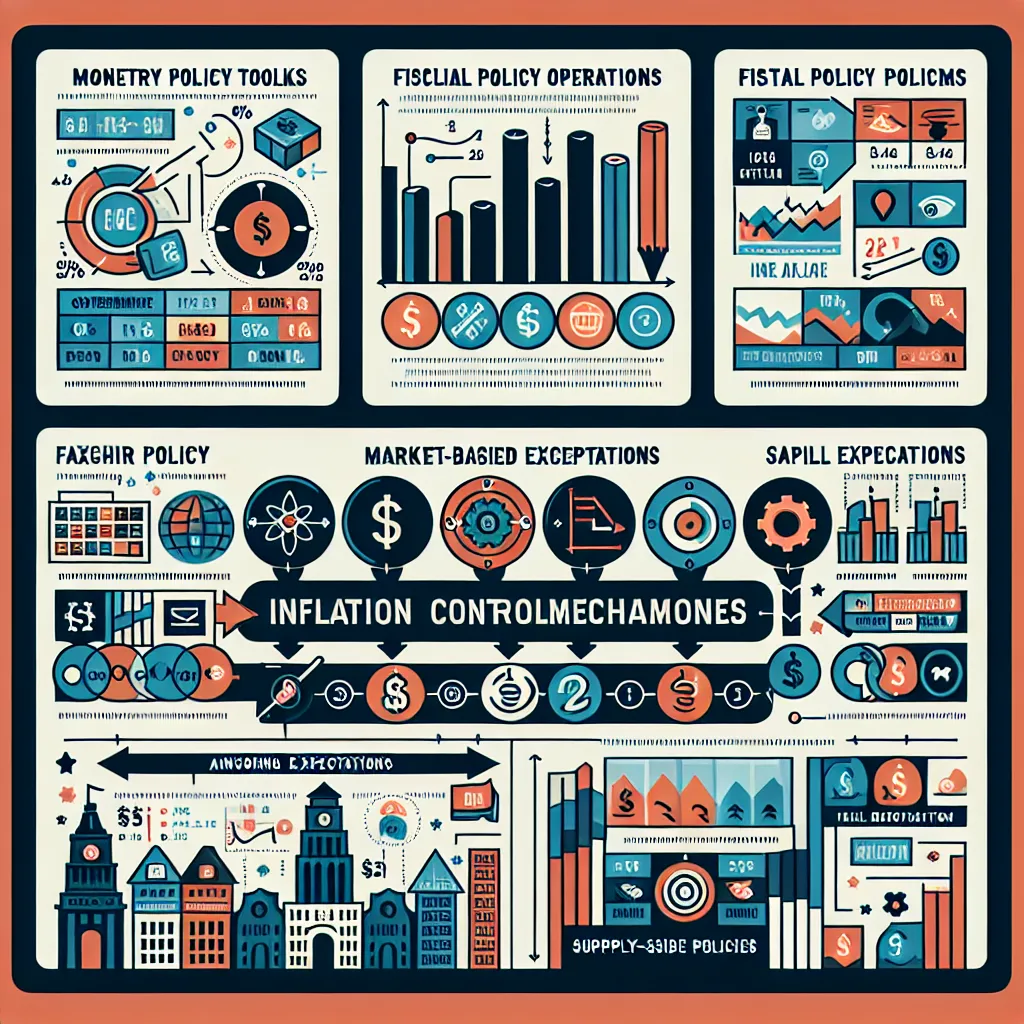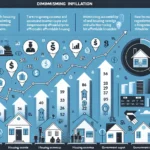Inflation is a critical economic issue that affects countries worldwide, and it’s no surprise that it frequently appears in IELTS Writing Task 2 questions. The role of government intervention in controlling inflation is a particularly common topic, as it combines economic policy, governance, and social impact. Based on past exam trends and the current economic climate, we can expect this theme to continue appearing in future IELTS tests. Let’s explore a sample question and develop strong essay responses to help you prepare for this important topic.
Analyzing the Question
Some people believe that governments should intervene to control inflation, while others argue that the free market should determine prices. Discuss both views and give your own opinion.
This question is asking you to consider two opposing viewpoints on how to manage inflation:
- Government intervention to control inflation
- Allowing the free market to determine prices
You need to discuss both perspectives and then provide your own opinion on which approach you believe is more effective or appropriate.
Sample Essay: Band 8-9 Response
Here’s a high-scoring sample essay that effectively addresses all aspects of the question:
In today’s complex economic landscape, the debate over how best to control inflation remains a contentious issue. While some advocate for government intervention, others believe in the power of the free market to regulate prices naturally. This essay will examine both viewpoints before presenting my own perspective on this matter.
Proponents of government intervention argue that it is necessary to maintain economic stability and protect citizens from the negative impacts of rising prices. They contend that governments have the tools and resources to implement policies such as interest rate adjustments, price controls, and fiscal measures to curb inflation. For instance, central banks can raise interest rates to reduce borrowing and spending, thereby cooling an overheating economy. Moreover, governments can implement wage and price controls in extreme cases to prevent runaway inflation, as seen in some Latin American countries during periods of hyperinflation.
On the other hand, free market advocates assert that government intervention often leads to unintended consequences and market distortions. They believe that prices should be determined by the natural forces of supply and demand, allowing for more efficient resource allocation and economic growth. This perspective suggests that when governments artificially control prices, it can lead to shortages, black markets, and reduced economic productivity. The historical failure of centrally planned economies is often cited as evidence supporting this view.
In my opinion, a balanced approach that combines elements of both perspectives is most effective in controlling inflation. While I believe that the free market generally leads to more efficient outcomes, I also recognize that some level of government oversight is necessary to prevent extreme price fluctuations and protect vulnerable populations. A nuanced strategy might involve allowing market forces to operate freely under normal circumstances while reserving government intervention for exceptional situations or to address specific sectors of the economy.
For example, governments could focus on maintaining a stable monetary policy and fostering competition rather than directly controlling prices. They could also implement targeted measures to address inflation in essential goods and services, such as food and healthcare, without disrupting the entire market. This approach would help mitigate the negative impacts of inflation on citizens while still harnessing the efficiency of free market mechanisms.
In conclusion, while both government intervention and free market approaches have their merits in controlling inflation, I believe a carefully calibrated combination of the two is most likely to yield positive results. By leveraging the strengths of each perspective, policymakers can work towards achieving economic stability and prosperity for all members of society.
(Word count: 392)
 Inflation Control Mechanisms
Inflation Control Mechanisms
Sample Essay: Band 6-7 Response
Here’s a sample essay that demonstrates writing at the Band 6-7 level:
Inflation is a big problem for many countries, and people have different ideas about how to control it. Some think the government should step in, while others believe the free market should decide prices. I will discuss both views and give my opinion.
Those who support government intervention say it’s important for keeping the economy stable. They think the government has ways to stop prices from going up too fast. For example, the government can change interest rates or put limits on prices. This can help people who don’t have much money and are hurt by high prices. Also, the government can use its power to make sure important things like food don’t become too expensive.
On the other hand, people who believe in the free market say that letting supply and demand control prices is better. They argue that when the government tries to control prices, it can cause problems like shortages. They think that businesses and consumers should be free to make their own choices about buying and selling. This way, the economy can grow naturally and be more efficient.
In my opinion, both sides have good points, but I think a mix of the two approaches is best. The government should let the market work most of the time, but be ready to step in if things get really bad. This way, we can have the benefits of a free market while still protecting people from very high inflation.
For instance, the government could focus on keeping the economy stable overall, but not try to control every price. They could also help people understand how to deal with rising prices by giving them information and advice. This would be better than just telling everyone what they can charge for things.
To sum up, while both government control and free markets have their good points for managing inflation, I believe a balanced approach that uses both ideas is the best way to keep prices under control and help the economy grow.
(Word count: 329)
Key Considerations for Writing
When tackling this topic in IELTS Writing Task 2, keep the following points in mind:
- Balanced argument: Ensure you discuss both viewpoints fairly before giving your own opinion.
- Specific examples: Use concrete examples to illustrate your points, such as historical instances of inflation control or current economic policies.
- Economic terminology: Incorporate relevant economic terms to demonstrate your understanding of the subject.
- Clear structure: Use paragraphs effectively to organize your ideas and make your essay easy to follow.
- Cohesive devices: Employ linking words and phrases to connect your ideas smoothly.
Vocabulary and Grammar Tips
For a Band 8-9 essay:
- Use sophisticated vocabulary related to economics, such as “fiscal policy,” “monetary measures,” and “market distortions.”
- Employ complex sentence structures, including relative clauses and conditionals.
- Use advanced cohesive devices like “moreover,” “furthermore,” and “nevertheless.”
For a Band 6-7 essay:
- Use a mix of common and less common vocabulary related to the topic.
- Vary your sentence structures, but focus on clarity over complexity.
- Use basic cohesive devices like “however,” “on the other hand,” and “in conclusion.”
Essential Vocabulary
Here are some key terms to remember when writing about government intervention and inflation control:
- Inflation (noun) /ɪnˈfleɪʃən/ – A general increase in prices and fall in the purchasing value of money.
- Intervention (noun) /ˌɪntərˈvenʃən/ – The action or process of intervening, especially by a government in economic affairs.
- Fiscal policy (noun) /ˈfɪskəl ˈpɒləsi/ – Government policy relating to taxation, spending, and borrowing.
- Monetary policy (noun) /ˈmʌnɪtəri ˈpɒləsi/ – The actions of a central bank to control the money supply and interest rates.
- Free market (noun) /friː ˈmɑːkɪt/ – An economic system based on supply and demand with little or no government control.
- Price controls (noun) /praɪs kənˈtrəʊlz/ – Government-mandated limits on the prices of goods and services.
- Supply and demand (noun) /səˈplaɪ ənd dɪˈmænd/ – The amount of a commodity available and the desire of buyers for it, considered as factors regulating its price.
- Economic stability (noun) /ˌiːkəˈnɒmɪk stəˈbɪləti/ – A state of the economy in which there are no major fluctuations in economic activity.
- Hyperinflation (noun) /ˌhaɪpərɪnˈfleɪʃən/ – Extremely rapid or out of control inflation.
- Market distortion (noun) /ˈmɑːkɪt dɪˈstɔːʃən/ – An economic scenario where the free market equilibrium is not achieved due to interference.
Conclusion
The role of government intervention in controlling inflation is a complex and frequently debated topic that is likely to appear in future IELTS Writing Task 2 questions. By understanding the key arguments on both sides and practicing your essay writing skills, you’ll be well-prepared to tackle this subject in your exam.
To further enhance your preparation, consider practicing with these related topics:
- The impact of inflation on income inequality
- The effectiveness of different monetary policies in controlling inflation
- The role of central banks in managing inflation
- The relationship between inflation and unemployment (Phillips Curve)
- The effects of globalization on inflation rates
Remember, the best way to improve your writing skills is through practice. Try writing your own essay on the sample question provided in this article and share it in the comments section below. This will not only help you refine your skills but also allow you to receive feedback from others preparing for the IELTS exam.
For more insights on related economic topics, you might find these articles helpful:
- The Impact of Inflation on Housing Markets
- Effects of Inflation on Food Prices
- The Role of Fiscal Policy in Controlling Inflation
Good luck with your IELTS preparation!


